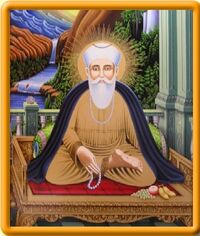
Guru Nanak
Guru Nanak (ਗੁਰੂ ਨਾਨਕ, 15 April 1469 - 7 May 1539) is the founder of Sikhism and the first of the ten Gurus of the Sikhs. He was born in the village of Talwandi, also called Rai Bhoe-ki Talwandi, now known as Nankana Sahib, near Lahore in present-day Pakistan. He was born, according to all ancient Sikh records, in the early morning of the third day of the light half of the month of Baisakh (April - May) in the year 1469 AD. Before Guru Nanak breathed his last in 1539, his name had travelled not only throughout India's north, south, east and west, but also far beyond into Arabia, Mesopotamia(Iraq), Ceylon, Afghanistan, Turkey, Burma and Tibet. Birth Anniversary: (Lunar Linked) 15 November 2005; 5 Nov 2006; 24 Nov 2007; 13 Nov 2008
It was a dark and moonless night; the clouds were heavy with rain as it was the monsoon season. Suddenly lightning flashed and thunder sounded as a few raindrops started to fall. The village was asleep. Only Nanak was awake and the echo of his song filled the air.
Nanak’s mother was worried because it was pitch dark and day break was far away. The lamp in his room was burning. She could hear his melodious voice as he sang, restraining herself no longer she knocked at his door. “Go to sleep, my son, the sun is a long way ahead.” Nanak became silent. From the darkness sounded the call of the sparrow-hawk. “Piyu, piyu, piyu!” it called.
- “Listen, mother!” Nanak called out. “The sparrow-hawk is calling to his beloved; how can I be silent, because I am competing with it? I will call my beloved before he calls his – even for longer because his beloved is nearby, perhaps in the next tree! My beloved is so far away. I will have to sing for lives upon lives before my voice reaches Him.” Nanak resumed his song.
Guru Nanak’s path was, is & will ever remain decorated with endless rows of true flowers; he realised God by singing virtues of God and following a life of true deeds. Guru Nanak did not practise normal Hindu austerities, meditation or yoga; he only sang in the beautiful poetic forms of the time. Singing, often extemporaneously, with all his heart and soul, so much so that his singing became his meditation, his purification and his yugam (yoking ones self to the almighty, to Satguru. This was Nanak’s path; decorated with true flowers of song, songs of glory and praise of the Almighty Lord.
Whatever he has said was said in verse straight from GOD. His blissful & mesmerizing songs are not those of an ordinary singer; they have sprung from within one who has known. There is the ring of truth, the reflection of God within them. It is these songs, songs of love and expressions of truthfulness & worship, along with the songs of Guru Nanak's nine successors, that form the eternal Guru of the Sikhs, the Guru Granth Sahib.
Background[]
His father was Kalayan Das Mehta, also known as Mehta Kalu, and his mother was Mata Tripta ji. They were Hindus belonging to the Vedic Brahmin caste. Guru ji had an older sister called Bebey Nanki, who was the first to recognise Nanak as an enlightened Soul. Guru Nanak from an early age evidenced a questioning and enquiring mind. He soon mastered the Vedas and Sanskrit and was enrolled into a madrassa to study Persian and Arabic. Picking up both languages quickly, he surprised is teacher by composing an acrostic on the Persian language. When it was time for Nanak to be invested with the twice born thread the “sacred” thread, called the Janeu, he refused to take part in the ritual. When the priest continued to insist that the young Nanak done the string he went into a trance and sang:
- Let mercy be the cotton, contentment the thread,
- Continence the knot and truth the twist.
- Oh priest! if you have such a thread,
- Do give it to me.
- It will not wear out, nor get soiled, nor be burnt, nor lost.
- Says Nanak, blessed are those who go about wearing such a thread.
- (Rag Asa)
